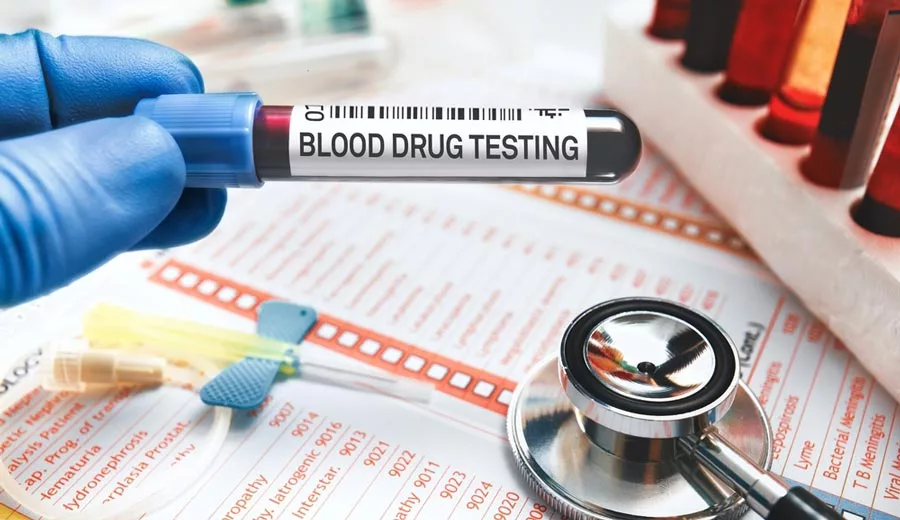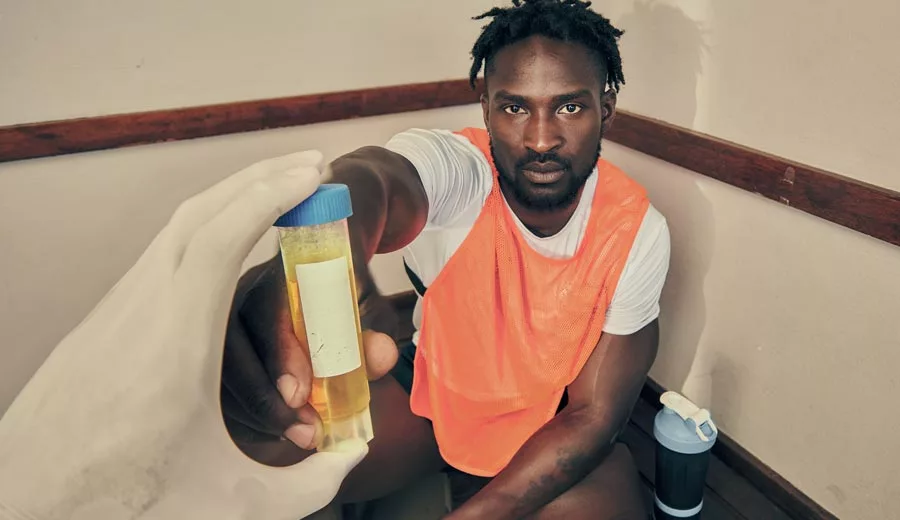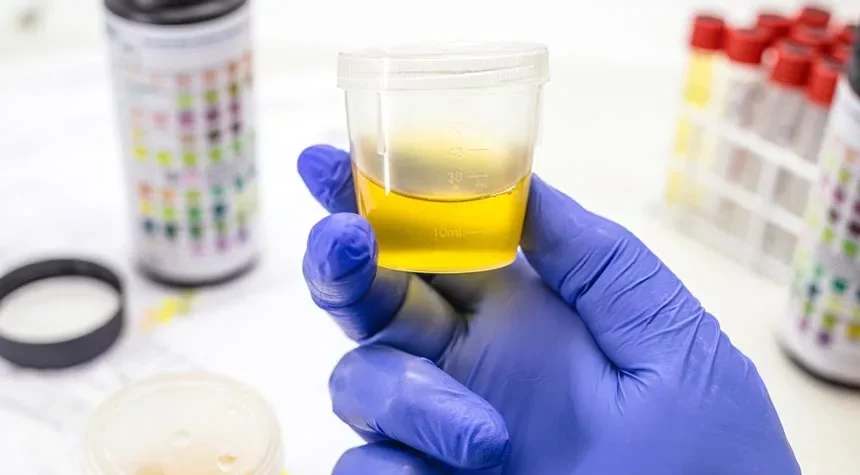What to Do If You Are Caught Substituting Urine Drug Test
Over the past few years, drug screens have become more commonplace in many settings throughout the U.S., and many people have started to come up with creative ways of cheating drug tests in order to make sure their results come back clear.
Using fake urine samples is a particularly common way to beat a drug test, whether buying a fake urine specimen online or using someone else’s urine directly. However, drug testers have also become more wary of these cheating methods and thus have found ways of detecting them.
If you have been caught tampering with your drug test results, it is important to know how to respond to this situation and move forward. Keep reading to learn more about what to do if you are caught substituting urine drug test materials, and how Find Addiction Rehabs can help you take your next steps today!
What are the Different Types of Drug Test?

There are several different types of drug tests, each with its own advantages and disadvantages. Which of these will be used can vary depending on where the test is being administered, the suspected drug being used, and the test’s availability.
With that being said, the most common types of drug testing methods are:
- Urine drug testing (UDT): This is the most common type of drug test, as it is relatively inexpensive and easy to administer. Urine testing can detect a wide range of drugs but the drug concentration detection window for UDT is relatively short, typically only a few days to a few weeks.
- Blood drug testing (BDT): BDT is more expensive than UDT, but it is more accurate and can detect drugs for longer periods of time. BDT is often used in cases where there is a suspicion of recent drug use, such as after an accident or in a DUI investigation.
- Hair drug testing (HDT): HDT is the most expensive type of drug test, but it is also the most reliable. HDT can detect drugs for up to 90 days, making it a good choice for detecting chronic drug use, but it is not as sensitive and cannot detect all drugs.
- Saliva drug testing (SDT): SDT, or oral fluid testing, is a relatively new type of drug test that is becoming increasingly popular. Less invasive than UDT or BDT, these tests can be self-administered. However, they are not as accurate as other tests, it cannot detect all drugs.
What are Drug Tests Used For?
In order to understand why falsifying drug test results has become so common, you must first understand the different contexts in which a drug test may be required. A drug or alcohol test can be used for a variety of purposes, including:
- Employment tests: Employers may require drug testing as a condition of employment, either before or after hiring. This is often done to ensure that employees are adhering to a drug-free workplace policy and to protect the safety of other employees and the public.
- Sports testing: Both scheduled and random drug tests are common in professional and amateur sports, to ensure that athletes are not using performance-enhancing drugs to get an unfair advantage in their field.
- Court-ordered testing: The Court may order drug testing as part of a probation or parole agreement or as part of a treatment program for substance abuse.
- Healthcare testing: Drug testing may be used by healthcare providers to monitor patients who are taking prescription medications, or to screen for drug use in patients who are seeking treatment for other medical conditions.
- School tests: Academic settings may use drug testing to screen students for drug use, or to investigate suspected drug use.
The type of drug test that is used will vary depending on the purpose of the test. For example, a urine test is the most common type of drug test for employment, while a hair test may be used for sports or court-ordered testing.
Drug tests can be a valuable tool for preventing and detecting drug use. However, it is important to note that drug tests are not perfect. They can produce false positives or false negatives, and they can only detect drug use that has occurred within a certain period of time.
Why is Drug Test Cheating So Common?

People cheat on their drug tests for many reasons, whether they are facing workplace drug testing, court-ordered drug testing programs, or any other situation in which their substance use may be called into question.
Whether drinking detox drinks to get more diluted urine, substituting human urine with animal urine, dropping colored dye in your toilet water, or using someone else’s urine sample during the collection process, all of these anti-drug test methods may be used to try getting a negative result.
Some of the most common reasons drug users will attempt to cheat their drug tests include:
- The high stakes involved: For some people, losing their job or being unable to obtain employment is a very real possibility if they test positive for drugs.
- The ease of cheating: There are a number of ways to cheat on drug tests, some of which are relatively easy to do, making this more appealing than receiving a positive result.
- The lack of consequences: In some cases, there are few or no consequences for cheating on a drug test. This can make it seem like a low-risk option for people who are desperate to avoid testing positive.
- The stigma associated with drug use: Some people may feel pressure to cheat on a drug test in order to avoid the stigma associated with drug use.
- The lack of access to treatment: For some people, the only way to pass a drug test is to cheat. This may be because they do not have access to treatment or because they are not willing to seek treatment.
- The pressure to perform: In some cases, people may feel pressure to cheat on a drug test in order to continue performing well in their job or school.
It is important to note that drug test cheating is illegal in many jurisdictions, with more states enacting laws making cheating a drug test result a criminal offense. If you are caught cheating on a drug test, you could face serious consequences, including criminal charges.
The Drawbacks of Trying to Cheat a Drug Test
There are many reasons why drug abusers should not attempt to fool their drug tests. For one, their attempts will not always be effective. There are many different types of drug tests, and some are more difficult to cheat than others. If you are not careful, you could end up failing the test even if you try to cheat.
Attempting to fool a drug test is also very risky. Some of the methods used by drug test cheaters can be dangerous. For example, using synthetic urine specimens can lead to health problems if it’s not handled properly.
Not to mention, many people will sell fake detox kits and synthetic samples online knowingly or purposefully. Manufacturers of these products are not held to certain quality expectations or safety standards and often do not have their customers’ best interests in mind.
Can You Be Penalized for Drug Test Substitution?
There is also the fact that cheating on a drug test is illegal. In some states, cheating laws can land your attempt with a class B misdemeanor, up to one year in prison, or a minimum fine of $1,000, and a potentially higher maximum fine.
Finally, attempting to fool a drug test with adulterated samples can damage your reputation. If you are caught trying to cheat a drug test, this could harm your reputation at work or school, leading to the loss of your job or expulsion from your academic institution.
If you are thinking about trying to cheat a drug test, it is important to weigh the risks carefully. There are many other ways to deal with a positive drug test, such as seeking treatment or getting help from a professional.
What to Do If You Are Caught Cheating On a Drug Test

Many factors and situations can make a person cheat on their drug test. Whether you have been discovered at the collection site for cheating under direct observation, or your medical review officer has determined that you presented a fake or diluted sample, it is important to know how you should respond to this situation.
Honesty is the Best Policy
The first thing to know after you have been caught cheating on a drug test is that being honest in this situation will be your best option. You have already been caught cheating, and lying about your actions will likely only further aggravate the situation.
When taking responsibility for your behavior, you are more likely to make a good impression on the people in charge of your test. In some cases, you may be allowed to avoid legal repercussions in favor of treatment or community service.
Asking for Help
If you have gotten to the point of trying to cheat a drug test, then it is safe to say that your substance abuse has gotten out of control, and it is time to ask for help.
While it is normal to worry that you will face discrimination for your drug use, there are many resources available to help make sure you can successfully and discreetly overcome this problem.
Having an addiction does not mean that you are weak or less of a person. All this means is that you are struggling with a serious disease. Fortunately, it is one that can be treated and managed with the right support.
Why Seeking Treatment is Important
Addiction is a chronic disease that can be very difficult to overcome on your own. Seeking addiction treatment can help you to better understand your substance use disorder. An addiction can have many contributing factors, so it is important to know the underlying causes of your addiction and develop coping mechanisms to deal with them.
Treatment can also help you learn how to manage your cravings. One of the biggest challenges of addiction is dealing with cravings, which is why it is important to have professional help when resisting the urge to use drugs or alcohol.
It is also important to keep in mind that recovery is hard work, and it’s important to have a support system to help you through tough times. Treatment can help you to connect with other people who are struggling with addiction and who can offer you support and encouragement.
Finally, professional treatment can help you develop healthy coping mechanisms. Addiction is often a way of coping with difficult emotions or experiences. Treatment can help you learn better ways of dealing with stress and difficult emotions in a way that does not involve drugs or alcohol.
What Treatment Options are Best for Drug Dependence?

The best addiction treatment options for you will depend on your individual needs and circumstances. However, there are some general factors that can help you make a more informed decision.
The severity of your addiction is a particularly important factor to take into consideration when choosing the right treatment option. If you are struggling with a severe addiction, you may need a more intensive treatment program, such as inpatient rehab.
Your personal preferences will also play into this decision. Some people prefer inpatient rehab, while others prefer outpatient treatment. There are also many different types of therapy and counseling available, so you can find one that fits your needs and style.
Another important thing to consider when seeking treatment is your insurance coverage and budget. If you have insurance, it will likely cover some or all of the cost of treatment. However, it is important to check your coverage carefully before you start treatment.
With these factors in mind, here are some of the most common addiction treatment options:
- Inpatient rehab
- Outpatient rehab
- Intensive outpatient program (IOP)
- Partial hospitalization program (PHP)
- Medication-assisted treatment (MAT)
- Behavioral therapies and counseling
- Support groups
No matter what type of treatment you choose, it is important to find a program that is right for you and that you feel comfortable with. Addiction is a serious disease, but it is treatable. With the right treatment, you can overcome your addiction and live a healthy and fulfilling life.
Get Support and Proven Treatment Options Here!
If you or a loved one is struggling with addiction, know that you are not alone and help is available. Find Addiction Rehabs helps people like you find the treatment they need to overcome their substance abuse and live happier, healthier lives.
Our hotline is available 24/7 to answer all of your treatment questions and provide you with recovery tools and resources. Recovery is just a phone call away. Reach out now to get started today!
FAQs on Getting Caught Substituting a Urine Drug Sample

What Substances Do Urine Drug Tests Look For?
Urine drug tests can look for a variety of illicit and controlled substances, including:
- Amphetamines, including drugs like Adderall, Dexedrine, and Vyvanse.
- Barbiturates, such as Seconal and Phenobarbital.
- Benzodiazepines, including drugs like Xanax, Valium, and Klonopin.
- Cocaine
- Marijuana
- Opiates, such as heroin, morphine, and codeine.
- Phencyclidine (PCP)
- Ethanol (alcohol)
Such substances that a urine drug test looks for will vary depending on the purpose of the test. For example, a workplace drug test may only look for a few common drugs, while a drug test for a substance abuse treatment program may look for a wider range of substances.
Can I Get In Trouble for Using a Fake Urine Sample for a Drug Test?
Yes, you can most definitely get into trouble when you substitute urine samples for a drug test. The specific gravity of consequences you may face will vary depending on the state you live in and what substances you are abusing.
For example, states like Texas, South Carolina, and Oregon makes cheating particularly difficult. If a person intentionally cheats on their drug test, they can face significant fines and possible jail time.

